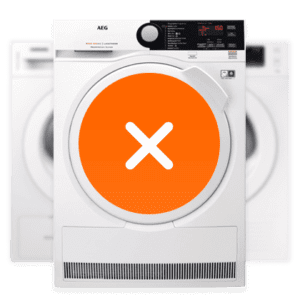Dryer not drying properly; what to do?
It can be very annoying when your dryer is not doing its job properly. If your dryer is not drying properly, it will cost you unnecessary time, but also money. This means that you have to turn on your dryer again, which uses more energy than it should. Besides that your laundry can start to smell when it stays wet for too long. In short, there are plenty of reasons to make sure that your tumble dryer is getting your laundry dry.
To fix this problem, you first need to know why your dryer is not getting your clothes dry. Find out what could be causing the problem below.
Correct load and drying program
Like your washing machine, your dryer has different programs for different types of laundry. To preserve your clothes and get the perfect dry, it is important to choose the right programme. Different materials have different drying times. Synthetic fabrics, for instance, often dry faster than cotton. How much washing you put in the drum is also important. Dryers have a certain weight limit, which indicates how many kilos of wash you can fit in the dryer. Often you can cram more laundry in the drum than the fill weight indicates, but the dryer is not designed for this. So consider the fill weight as the maximum load of your dryer. What the maximum load is may also be determined by the type of drying program. Check your dryer’s manual to find out how much laundry you can dry with each specific drying cycle.
Clean the sensor
Most dryers have a sensor that measures humidity levels. If the sensor is dirty, the dryer is less able to judge whether your laundry is already completely dry or not. Leftover detergent and fabric conditioner often contaminate the sensor and cause it to stick. Where the sensor is located in the dryer differs per model. In the manual of your dryer you can read exactly where the sensor is located. You can easily clean the sensor with a clean, damp cloth. We recommend that you clean the sensor thoroughly once a month.
Cleaning the filter and condenser
A clogged lint filter can be a reason for poor drying performance because it blocks the air. So clean the filter regularly to ensure that your laundry is dried properly. It is also important to check and clean the dryer condenser. If your condenser is dirty or clogged, the dryer will not be able to absorb moisture from the warm air as well.
Check the drain hose
If your dryer has a drain hose connected to the water outlet, the moisture from your clothes and bedding will automatically be removed during drying. A dryer will not dry properly if there is something wrong with this hose, such as if it is dirty, clogged or damaged. In time these problems can even cause a build up of water and a leak. Is your drain hose leaking?
Check the heating element
If the heating element is defective, you are a little further down the road. The chances of this happening are slim, so always check the sensor, filter, condenser, drain hose and make sure you’re on the right program first. If you notice that your dryer isn’t getting warm (enough) anymore, look at the dryer’s heating element and thermostat. These are located at the back of dryers. To access them, you’ll need to disconnect the back door. Several tumble dryers have a red reset button here – press it if you think it’s the reason why your laundry is staying wet. Does your tumble dryer still not heat up properly after this? Then you’ll need to replace these parts or look into getting a new dryer.

